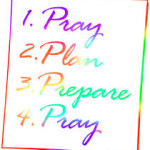How do you expect the unexpected?
When my husband was diagnosed with a tumor on his spine (in his neck region – at C4) September 2012, I felt as if my world got turned upside down. Life became uncertain on every angle and goals and dreams appeared to be dashed against the rocks. I did not know where the strength would come from to go on, but stopping was not an option.
Things got from bad to worse. The surgery appeared to be successful on day one but then there was evidence of serious complications and emergency surgery to the same area was the only remedy. We had anticipated a maximum of seven hospital days for him to recover, but this turned into six long weeks of a stressful, uncertain roller coaster ride.
I recently read a risk management article that talked about planning for the 5 D’s: death, disability, disaster, divorce and disagreement, and had to face the fact that I need to make some serious adjustments! Pondering the possibility of a personal health crisis is not easy and many people prefer to put this kind of planning on the backburner. Research shows that most people don’t like to talk about these issues, or develop and put in writing contingency plans for addressing them. But planning is important. Many financial advisors say that making financial plans for unexpected, serious health issues or adverse life events is key to survival.
I was certainly not prepared for this life-changing event, but now I am learning to think and plan differently. I encourage you to take the time and effort to be prepared for the unexpected health crisis or an adverse life event.
To Your Success,
Althea
Althea A. McLeish Wilson, RN, MSN
Educate . Empower . Encourage


